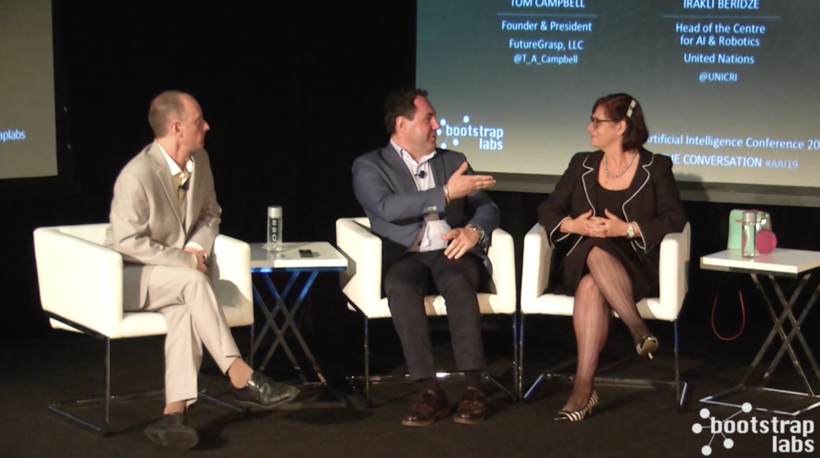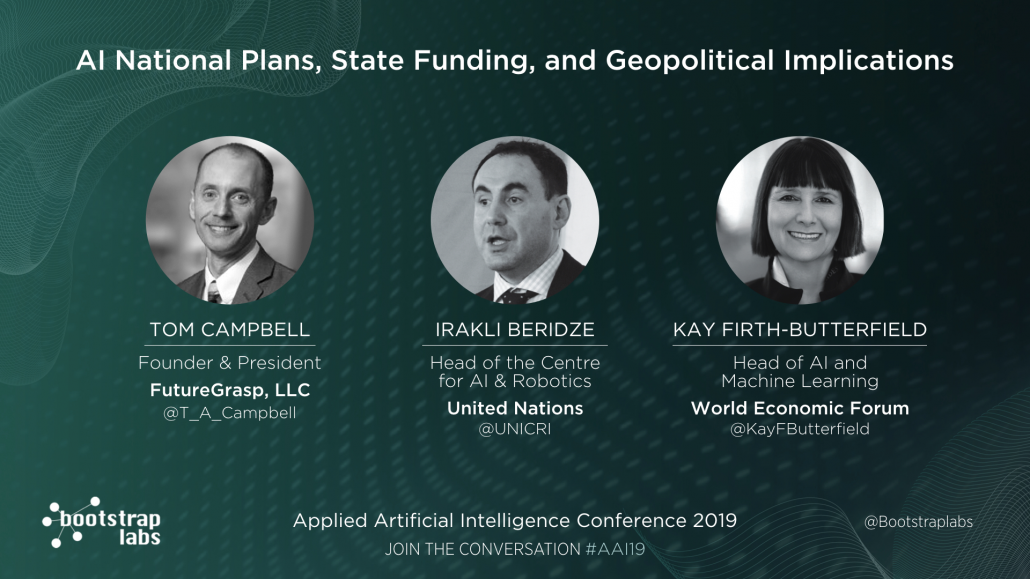Flashback: BootstrapLabs Applied AI Conference – AI National Plans, State Funding and Geopolitical Implications
The BootstrapLabs Applied Artificial Intelligence Conference 2019 #AAI19 brought together the brightest and most experienced experts in the field of AI for an immersive day of learning, discussion, and connection.
On BootstrapWorks we have released the videos from this past conference to relive the moments and spread the knowledge around the diverse topics covered by our experts on stage.
BootstrapLabs has built a community of more than 40,000 people from over 60 countries who care about applying Artificial Intelligence to solve the hardest problems of our society.
Get access to practical wisdom on Applied AI methodologies and take advantage of AI’s powerful potential, sign up here to receive the videos directly into your inbox.
How governments and the private sector engage with AI may very well dictate their future economic strength and security posture. While many states are active in AI, only a few have a planned national strategy for employing the technology. This keynote and fireside chat bring together experts from FutureGrasp, an advisory firm founded by the first National Intelligence Officer for Technology (NIO/TECH) with the National Intelligence Council (NIC) in the Office of the Director of National Intelligence (ODNI), the United Nations Interregional Crime & Justice Research Institute (UNICRI), and the World Economic Forum (WEF) to provide unique insights into what AI means for the future of geopolitics. Specifically, panelists address national plans and government investments into AI, and their respective geopolitical implications.
Presenter: Tom Campbell, Founder & President FutureGrasp LLC
Panelists: Irakli Beridze, Head of the Centre for AI & Robotics, United Nations; Kay Firth-Butterfield, Head of AI & ML, World Economic Forum
Some of the key takeaways from the session are:
- FutureGrasp created a report on AI National Plans around the world that will be published in the months after the conference: So far only 14 states developed an AI national plan and further 19 states expressed interest in doing so.
- An estimated total of $646B has been invested in unclassified AI activities around the world led by Saudi Arabia, China, UAE and the US. Research is the most popular sector by number of states invested and most funds are allocated to Infrastructure and Industrial Strategy.
- The World Economic Forum (WEF) is currently creating guidelines for procurement of artificial intelligence for the UK. This is an opportunity to shape the use of AI.
- UNICRI explores how AI can be used by criminals and how to counter this threat by empowering law-enforcement agencies.
- Countries should develop a national AI strategy because of the tremendous opportunity of the advancements in AI as well as the development of a deeper understanding of the threats posed by the technology in order to mitigate risk. This is why Europe has required all of their countries to develop national AI strategies.
- Countries have the power to channel AI talent towards meaningful applications like sustainable development through investments and events.
- Collaboration between the private sector and institutions like the WEF or the UN are essential to solve problems on a global scale.
About Tom Campbell:
Thomas A. Campbell, Ph.D. is founder and president of FutureGrasp, LLC, which advises organizations on trends and implications of emerging technologies. He is also a special advisor to BootstrapLabs, a senior fellow with the Council on Competitiveness, and a member of the steering/program committee for the AI Pioneers Forum. From 2015 to 2017, Tom was the first National Intelligence Officer for Technology with the National Intelligence Council in the Office of the Director of National Intelligence. His career encompasses national and international experience in government, academia, industry, startups and national laboratories.
About Irakli Beridze:
Irakli Beridze is Head Head of the Centre for AI and Robotics at the United Nations, UNICRI. He initiated and managed the first UN Programme on AI and Robotics and organized several high-level events at the United Nations General Assembly. He is a member of various international task forces and working groups advising governments and international organizations on numerous issues related to international security, scientific and technological developments, emerging technologies, innovation and disruptive potential of new technologies, particularly advances in automation, on labour markets and on the jobs of the future. He is a recipient of recognition on the awarding of the Nobel Peace Prize to the OPCW in 2013.
About Kay Firth-Butterfield:
Kay Firth-Butterfield is Head, AI & ML at the World Economic Forum and Barrister-at-Law and former part-time Judge in the United Kingdom and Professor of Law. She is an Associate Fellow of the Centre for the Future of Intelligence at the University of Cambridge, and Fellow of the Robert E. Strauss Center on international Security and Law at the University of Texas. She is Vice-Chair of the IEEE Initiative on Ethical Considerations in AI and Autonomous Systems. She is one of Robohub’s top 25 Women in Robotics in 2017 and co-founded AI-Austin, AI-Global and the Consortium for Law and Policy of AI and Robotics.
To sign up for our mailing list, click here.



